“Fire in a brothel”, or the Falkland epic “Sea Harrier”
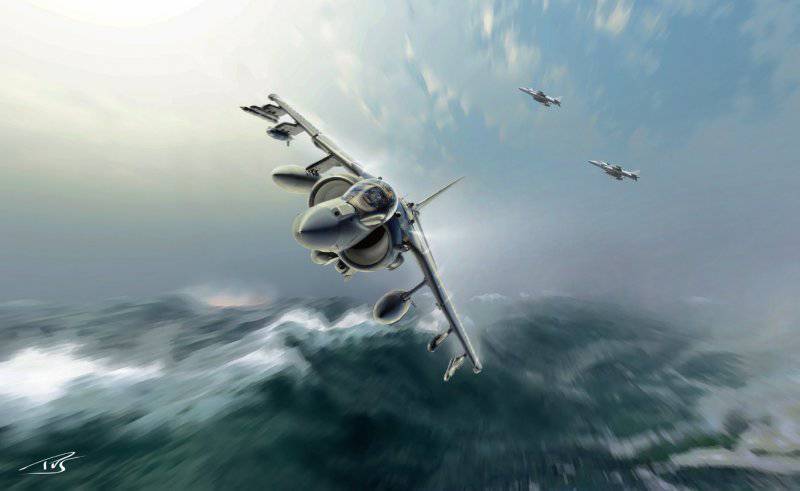
The factor of the participation of “Harriers” and aircraft carriers in the conflict was somewhere in the twentieth place after destroyers and frigates, a hundred helicopters, numerous landing forces and excellent training of British crews.
The damaged Glasgow destroyer continuously described circulation for a couple of hours. The artificially created roll obstructed the penetration of water while the emergency crew tried to repair the hole in the waterline area. Here so for victory!
And what about the Harriers? Below is a short report on their exploits and real contribution to the overall victory. Looking a little ahead, I note that the Falkland War was clear evidence of the opposite. The modern fleet has a real chance of victory without air cover. And he would have had more if the British were more serious about air defense. You can laugh, but it really is. What the Harriers did, neither aviation support, nor cover can not be called. One big and worthless expense item.
The second point of view is related to the analysis of the combat use of the Harriers with the issuance of profound conclusions about the need to build a “balanced fleet" With classic aircraft carriers, catapults and the notorious AWACS aircraft. Wow This is power.
Only, gentlemen, you should not look for meaning where it is not. We all know that being rich and healthy is certainly better than poor and sick. The British also knew this, having enough money only for the replicas of warships. And, according to the personal conviction of the author, if we consider this topic, then the question should be put differently. Was it possible to spend the funds in a more rational way instead of containing the rusty Hermes and building useless Invincibles?
The rest of the Falklands War was a replica of the modern war. With the use of passenger airliners for naval intelligence, sporting rifle shooting at attack aircraft and only six Argentine anti-ship missiles for the whole theater of operations. Although that theater was more like a circus.
Argi and the British not only fired at each other from the same machine guns (FN FAL), but even used the same ships. For example, the same “Sheffield” - 42-type destroyers built in Britain a couple of years before the conflict entered the battle core of the Argentine Navy.
Now, in the era of “Google Maps”, it will seem strange, but the marines of Her Majesty, who were on the march, did not have topographic maps of those useless islands. Intelligence agencies had to collect information manually, interviewing all those who, by chance, had ever been brought to Falkland.
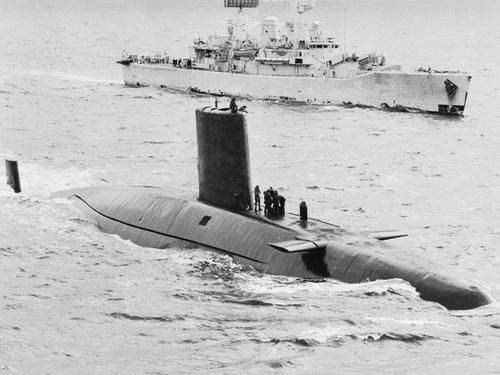
Rusty frigate Plymouth and submarines of the first generation Conkerror with torpedoes Mk.VIII of the 1929 model of the year (I'm not joking). Excellent complement each other
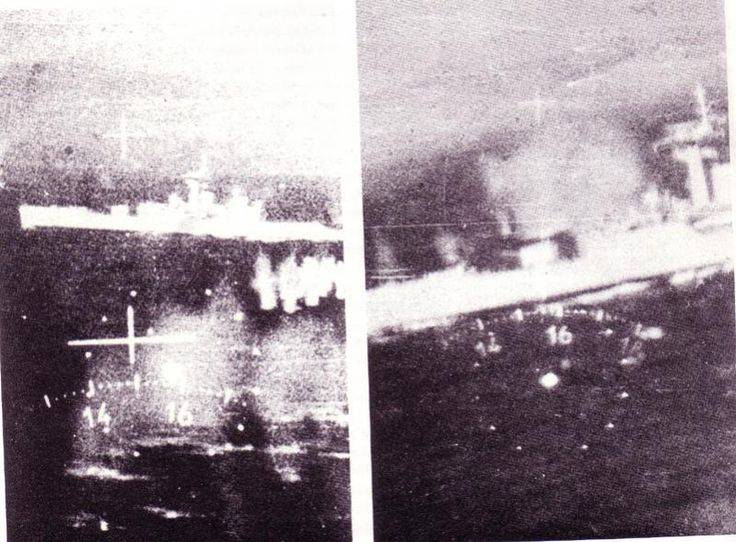
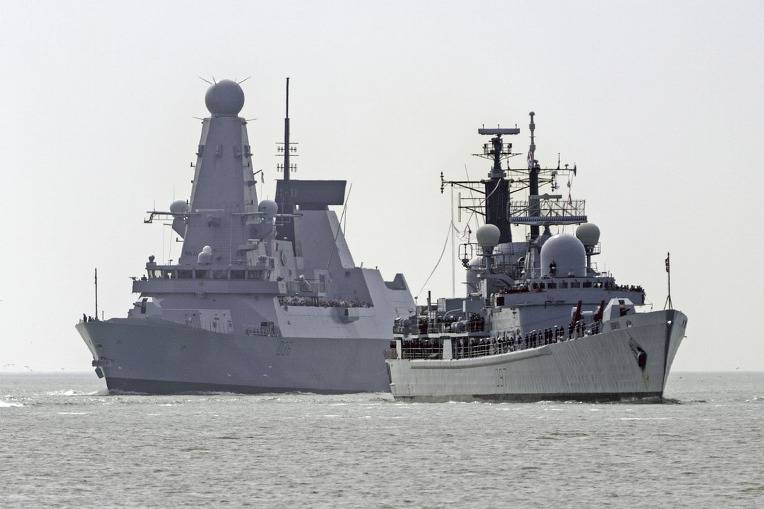
And here you are dreaming about aircraft carriers and AEW.
The British also had the most serious intentions and the project “Queen Elizabeth” CVA-01. Two classic 300-meter monster with a mixed air group, incl. Deck "phantoms" and AWACS aircraft. With a crew of 3200 people.
The 6400 man is more than served ON ALL ESCHINES, AIRWAYS AND TRAYS that were part of the Falkland squadron. And Queen Elizabeth itself with a full wing would have been more expensive than the fleets of England and Argentina combined.
For those who have not yet realized the curiosity of the process: for the sake of maintaining a pair of CVA-01, the British admirals would have to abandon all the other ships. A fleet of a pair of aircraft carriers. And around are empty berths.
In reality, they did not even master the construction of an escort for their CVA. From the planned series of destroyers Type 82 completed only one - “Bristol”.
Another funny situation is related to the old aircraft carrier Ark Royal (R09), which was “hacked to death by cursed Laborites”. How useful he would have been in the Falklands War!
And maybe not useful.
By the time of the cancellation, the age of “Ark Royal” was: from the moment of entry into service - 24 of the year, from the moment of laying it - 36 of years. Old bucket, built on obsolete standards of the Second World War (1943). The write-off of “Royal Arc” was preceded by two significant events: a) a fire on its hangar deck; b) the termination of the process of “cannibalization” of HMS Eagle (R05), whose spare parts were used to keep his colleague on the go. Alas, by the year 1978 there was nothing to shoot.
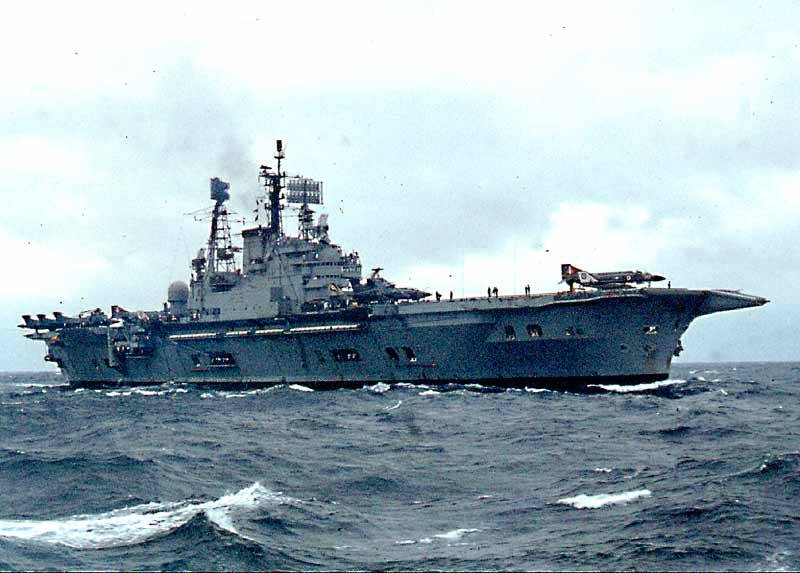
Do not be deceived by the capabilities of the air group of the last of the British "classic" aircraft carriers. At what distance are DRLO “Genit 3AEW” airplanes with a radar from World War II able to fly low-flying airplanes and cruise ships against the backdrop of water? And would the two operators, “Genit”, have enough strength to closely monitor the situation and direct modern fighters?
As for the “Phantoms”, there were all of them on board the entire 12, at best (when they replaced all the planes of other types) - on the order of 20-25 machines. According to open sources, the complexity of servicing Phantom was 35 man-hours per flight hour. In days 24 hours. Attention, the question: how many fighters could be constantly in the air, providing air defense of the British squadron?
Big money spoils people, and small ones just disfigure
Realizing that the dreams of the “classic” 300-meter aircraft carriers are unrealizable and empty, the British Admiralty imbued with the idea of “light” aircraft-carrying ships with VTOL. A ready-made sample of such a vertical was already in service ”- Houker Siddley Harrier. It remained only to adapt the “Lunya” to the sea-based and accustom to the implementation of destructive tasks.
Did the admirals understand that a subsonic “vertical line” without medium-range URVV and with a limited combat radius would always be inferior to “classical” fighters? Obviously understood. But they could not even think that everything would be so sad.
During the Argentine attacks sunk:
- Sheffield destroyer;
- the destroyer "Coventry";
- frigate "Ardent";
- frigate "Entiloup";
- the amphibious assault ship “Sir Galahed” (on the approach to the islands, an 1000-fnl. Was hit by an unexploded bomb; re-attacked and accounted for three days later in San Carlos Bay);
- transport / helicopter carrier "Atlantic Conveyor";
- landing boat Foxtrot Four (from the composition of the UDC HMS Fearless).
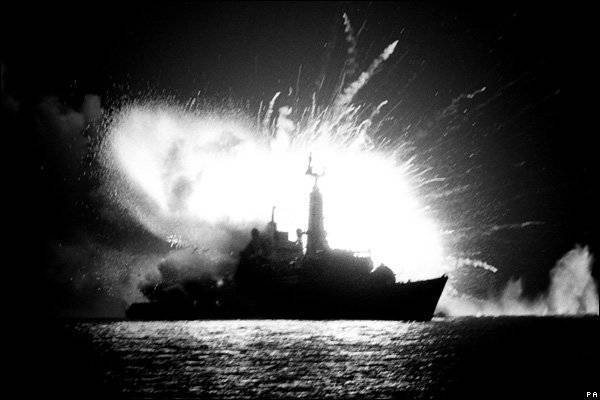
Damaged:
- the destroyer "Glasgow" - 454-kg unexploded bomb stuck in the engine room;
- The destroyer "Entrim" - unexploded aerial bomb;
- the frigate Plymouth - four (!) Unexploded bombs;
- frigate "Argonaut" - two unexploded bombs, "Argonaut" was withdrawn from the database area in tow;
- the frigate "Elekriti" - unexploded bombs;
- Arrow frigate - damaged by aircraft cannon fire;
- frigate "Broadsward" - punched through the unexploded bomb;
- frigate "Brilliant" - shot by "Daggers" from a strafing flight;
- landing ship "Sir Lancelot" - 454 kg unexploded bomb;
- the landing ship "Sir Tristram" - damaged by bombs, completely burned out, evacuated on a semi-submerged platform;
- amphibious assault ship "Sir Bedivere" - unexploded aerial bomb;
- British Way tanker - unexploded bombshell;
- transport "Stromness" - unexploded air bomb.
No need to finish the military academy to understand that the squadron of Woodward was in the balance from death. Whenever the Argentines flew on a mission, the British are not illusory “raked” from their opponent.
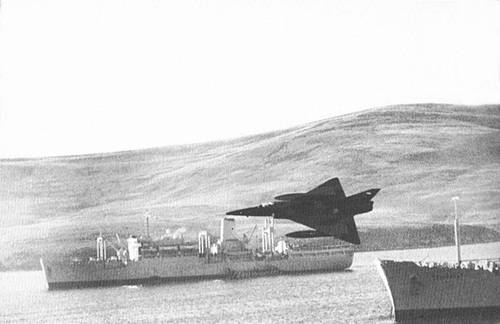
If bomb fuses worked a little more often, the Falkland Islands would have become Malvinas. With a reduction in the number of ships, the squadron’s combat capability was continuously decreasing, and the Argentine attacks would each time become more and more effective. Until you have reheated everyone like puppies.
What did the acclaimed "Sea Harriers" do at this time? The answer is known - they patrolled off the south-west coast of Falkland. It was there that the Argentine Daggers came out to test their inertial systems after the 700-km flight over the ocean. There they were waiting for the British aces, shooting helpless attack aircraft. Sailing without radar, missiles and the possibility of using the afterburner, otherwise “Dagger” on the way back collapse with empty tanks into the ocean.
As for the "Skyhawks" with the refueling system in flight, they immediately flew into the open ocean, where they unexpectedly attacked British ships from any point.
Supersonic “Super Etandara” did feel invulnerable. Quickly calculating ships, launching Exocset missiles and disappearing again in an unknown direction. On the British fortune, Argentina had only six rockets for five bomber aircraft. And instead of combat aircraft - junk from around the world: without radar, normal bombs, and with the only active aircraft tanker KS-130. But even before such a weak opponent, the naval VTOL aircraft proved to be completely ineffective.
Finale
All this mess comes down to a single question.
If the idea of Invincible and the VTOL failed in practice a complete and obvious fiasco, then were there any other ways to improve the combat capability of the British squadron?
For example, to send funds for the purchase of the shipboard SAM C-Sparrow. This was the standard NATO practice - the complex was installed on all large (and not very) surface ships of pro-American states. AIM-7 “Sparrow”, proven in combat, in an eight-charge launcher. In general, the system was far from perfect, but still could not be compared with the British “Sea Cat”.
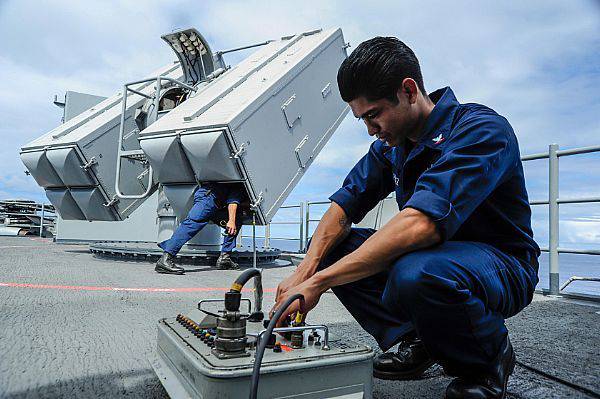
Own British air defense system looked wretched and had the same weak performance characteristics. As it turned out later, none of the 80 subsonic missiles launched hit the target! Based on these statistics, 13 from 15 frigates sent to the Falklands were completely defenseless from air attacks. Only two of them (“Brilliant” and “Broadsworth”, type 22) were equipped with a two-channel C-Wolfe air defense system, which are close in capabilities to the American “Sea Sparrow”. To lead in such a state the fleet to the other end of the world was pure adventure! Whoever does not believe, let him take another look at the list of bombed ships.
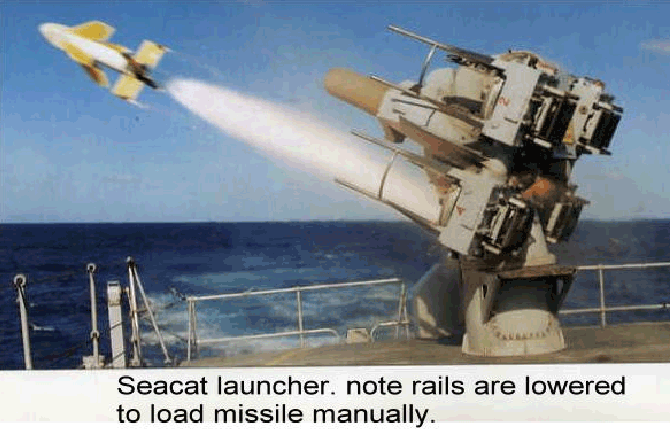
The presence of more or less adequate air defense missile systems on the remaining 13 ships could reduce British losses by several times, having beaten off the desire of the Argentinean pilots to engage in top mast bombing for a long time.
And this is only the simplest and most obvious solution! Otherwise, why do we need these helicopter carriers and “vertical-skaters”, if the entire fleet, excuse me, walks with bare ass ?!
It is curious that just a month after the end of the war, in July 1982, the British commission urgently left for the United States in order to acquire the latest know-how: the Phalanx anti-aircraft systems ...
And yet we will refrain from far-reaching conclusions. The need for air support, the right tactics and the appearance of the ships with the extreme lack of funds ... Life is wider than any rules and complexes. And Admiral Woodward hardly needs couch experts. He won that war without our advice.
Perhaps the only universal rule of this life: any resources need to be properly distributed. And the less of these resources, the more thoughtful should be their investment.
Information